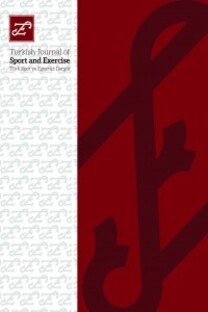Analysis on Sportsmanship as a Universal Value and Sportsmanship Orientations of Candidate National Athletes
Analysis on Sportsmanship as a Universal Value and Sportsmanship Orientations of Candidate National Athletes
___
- 1. Yetim A. Sociology and Sports. Morpa Kültür Yayınları, 2005; İstanbul.
- 2. Turkish Language Association. 2020; The concept of value Access address: https://sozluk.gov.tr/
- 3. Kuter-Öztürk F, Kuter M. Moral education through physical education and sports. Journal of Education and Humanities: Theory and Practice, 2012; 3(6): 75-94.
- 4. Ağaoğlu YS, Eker H. Examining the functional aspects of health, culture, and sports departments of universities in Turkey. Physical Education and Sports Sciences Journal, 2006; 4(4): 131-134.
- 5. Akari ÖF. The Sports in terms of values education. Master Thesis, Marmara University, Institute of Health Sciences, 2019; Istanbul.
- 6. Demirhan G. Sportive values and education. Community and Physician, 2014; 29(5): 351–355.
- 7. Koç Y, Seçer E. Relationship between sportsmanship behaviors and respect levels of university students in sport sciences. CBU J PhysEdu Sport Sci, 2018; 13(2): 247-259.
- 8. Gencheva N, Angelcheva M, Marinov T, Ignatov I. Assessment of sportsmanship in case of institutionalized adolescents, deprived of parental cares. Journal of HealthMedicine and Nursing, 2017; 42, 103-109.
- 9. Konur F. Investigation of reactivity and sportsmanship behaviors of individual and team athletes (Elazig province example). Master Thesis, Fırat University, Institute of Health Sciences, 2019; Elazig.
- 10. Wells MS, Ellis GD, Arthur-Banning SG, Roak M. Effect of staged practices and motivational climate on goal orientation and sportsmanship in community youth sport experiences. Journal of Park and Recreation Administration, 2006; 24(4): 64-85.
- 11. Yıldız M. Sportsmanship tendency in athletes: Goal commitment and the role of immorality in sports. PhD Thesis, Sıtkı Koçaman University, Institute of Health Sciences, 2019; Muğla.
- 12. Özsarı A. Sportsmanship tendencies of hearing-impaired volleyball players. Atatürk University, Physical Training and Sports Sciences Journal, 2018; 20(3): 113-122
- 13. Özsarı A, Demirel H, Yalçın YG, Altın M, Demir H. Sportsmanship tendencies of female basketball players. Turkish Sports Sciences Journal, 2018; 1(2): 66-71.
- 14. Gürbüz S, & Şahin F. Research Methods in Social Sciences. Ankara: Seçkin Yayıncılık, 2017; s.105. 15. Sezen-Balçıkanlı G. Turkish adaptation of the Multidimensional Sportsmanship Tendency Scale: Validity and reliability study. Gazi Physical Training and Sports Sciences Journal, 2010; 15 (1), 1-10.
- 16. Tabachnick BG, Fidell LS. Use of multivariate statistics.6th edition.(Translation: Mustafa Baloğlu), Ankara, Nobel Akademik Yay, 2015; p.79.
- 17. Yalçın YG, Tek T. Çetin MÇ. Investigation of sportsmanship tendencies of university students doing sports as amateurs. Turkish Sports Sciences Journal, 2020; 3(1), 29-34.
- 18. Kılınç B. Investigation of sportsmanship levels of individuals dealing with different sports branches. Master Thesis, Bozok University, Institute of Health Sciences, 2020; Yozgat.
- 19. Akoğlu HE, Ayyıldız E, Sunay H. Investigation of moral disengagement in sport and sportsperson ship behavior of athletes participating in international sport organizations. Sportive View: Journal of Sport and Educational Sciences, 2019; 6(2): 329-340. doi: 10.33468/sbsebd.111
- 20. Çalayır Ö, Yıldız N, Yaldız Ö, Çoknaz H. Examination of sportsmanship behaviors of athletes participating in hockey competitions. IU Sports Sciences Journal, 2017; 7(2): 1303- 1414.
- 21. Koç, H. Investigation of the Relationship Between Sportsmanship, Self-Efficacy and Psychological Resilience in High School Students. Master Thesis, Binali Yıldırım, Institute of Health Sciences, 2019; Erzincan.
- 22. Tsai E, & Fung L. Sportsmanship in youth basketball and volleyball players. Athletic Insight, 2005; 7(2): 37-46.
- 23. Kavussanu M. & Roberts CG. Moral functioning in sport: An achievement goal perspectives. Human Kinetics Journals, 2001; 23(1): 37-54.
- 24. Elik T. Sportsmanship tendencies and empathic tendency levels of amateur football players in the football teams of the Southeastern Anatolia region.Master Thesis, Gelişim University, Institute of Health Sciences, 2017; Istanbul.
- 25. Çakıcı HA. Examining the relationship between amateur football players' leadership characteristics and their sportsmanship tendency. Master Thesis, Selçuk University, Institute of Health Sciences, 2019; Konya.
- 26. Güllü S, Şahin S. An investigation of national wrestlers’ sportsmanship orientation levels. Turkish Studies, 2018; 13(18): 705-718.
- 27. Özdemir M. The relationship between sportsmanship behaviors of secondary school students and high school students and their sense of responsibility and behavior. Master Thesis, Binali Yıldırım, Institute of Health Sciences, 2019; Erzincan.
- 28. Kaye MP & Ward KP. Participant-related differences in high school athlete’s moral behavior. Athletic Insight, 2010; 12(1): 1-17.
- 29. Kılıç S. Examination of the relationship between personality traits and sportsmanship tendency levels of sports management students. Master Thesis, Atatürk University, Winter Sports and Sports Sciences Institute, 2019; Erzurum.
- Yayın Aralığı: 3
- Başlangıç: 1999
- Yayıncı: Selçuk Üniversitesi, Spor Bilimleri Fakültesi
Investigation of the Relationship Between Mental Training and Sports Injury Anxiety
Tufan ULCAY, Burcu KAMAŞAK, Kazım KAYA, Ersan KARA, Ahmet UZUN, Naime Meric KONAR
Seyed-nezamuddin MAKİYAN, Mujtaba ROSTAMİ
Farklı Kort Yüzeylerinde Tenis Müsabakalarının Analizi
Serkan REVAN, Şükran ARIKAN, İhsan DOĞAN
Kredi ve Yurtlar Kurumunda Kalan Üniversite Öğrencilerinin Kontrol Odağı Düzeylerinin İncelenmesi
